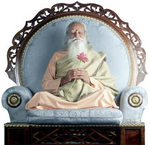![]() What does the new James Cameron film have to do with Hinduism? Quite a lot, hoped many Hindus, anticipating the next Matrix. But would the film denigrate Hinduism’s sacred teachings about the descent of the Divine? At least that was the fear of some community activists, gearing up for protests and boycotts.
What does the new James Cameron film have to do with Hinduism? Quite a lot, hoped many Hindus, anticipating the next Matrix. But would the film denigrate Hinduism’s sacred teachings about the descent of the Divine? At least that was the fear of some community activists, gearing up for protests and boycotts.
It turns out that Avatar is neither. But it is, as this Hindu movie review points, an opportunity to reflect on what the term has to tell us about civilization and human (and divine) value.
Avatar’s reversal of fortune
by Maxim Osipov for The Age
With the dazzling 3D-vortex of colours, actions and emotions, James Cameron’s Avatar seems to have given everyone something to rave about.
But let’s get it straight — Avatar is a downright misnomer for this latest new blockbuster.
No,
not because, sadly for Hare Krishna moviegoers, the film’s got nothing
to do with Hinduism except its Sanskrit name. And some Hindu activists
who habitually frisk all new releases for concealed sacrileges also
needn’t worry — there are none in Avatar, or at least not more that in those little digital icons they hide themselves behind on their own e-chats.
It’s because the movie reverses the very concept that the term “avatar” is based on.
Leave
aside the fact that Hindu theology reserves the use of “avatar”, which
in Sanskrit literally means “descent”, almost exclusively for
appearances of Vishnu on Earth. The key point here is that an avatar
always descends from a higher realm into the lower, restores
prosperity, wisdom, and happiness — and moves on unchanged after the
mission is accomplished.
However, the “avatar” Jake
Sully — and we the viewers along with him — shortly after his descent
into the world of Na’vis sees the “higher” realm of earthlings rapidly
grow pallid and repulsive in comparison to the pristine world of
supposed savages. The “civilised humans” turn out as primitive, jaded
and increasingly greedy, cynical, and brutal — traits only amplified by
their machinery — while the “monkey aliens” emerge as noble, kind,
wise, sensitive, and humane.
We, along with the Avatar hero, are now faced with an
uncomfortable yet irresistible choice between the two races and the two
worldviews. And invariably, along with him we cannot help but lean
toward the far more civilised insides within the long-tailed,
blue-skinned, and technologically infantile exterior.
So
much for a descending “avatar”. Jake soon admits to himself in his
videolog: “I realised that I had it backwards, I wasn’t sure what was
the dream and what was real.” Having regained through the avatar body
not just his legs, but his dignity, his freedom, and his brethren whose
love and trust he struggles to earn, the rescuer becomes the rescued,
the benefactor becomes the benefitted. The “avatar” becomes . . . well
. . . a refugee among the aborigines so content inwardly that they
wouldn’t trade their tree for whatever the savvy “sky people” gods have
to offer! Contrary to The Matrix’s Neo, Jake plugs into a
supposedly illusory world to discover it to be much more tangible,
wholesome and true than his own — and wants to stay in.
This makes us ask the question: Why? And what on Earth (or on Pandora) do “culture”, “civilisation”, and “human” stand for?
Not
succumbing to the stock trifle of sci-fi genre, James Cameron makes
this question the fourth dimension of his movie — and answers it most
convincingly: It’s the qualities of kindness, gratitude, regard for the
elderly, self-sacrifice, respect for all life and ultimately humble
dependence on a higher intelligence behind nature that qualify one as
cultured, civilised, and human.
The other alternative is summed up by Jake Sully: “This is how it’s
done. When people are sitting on something that you want, you make them
your enemy so that you can drive them out.” And “They have already
killed their mother”. Here you have it, the savage — give or take his
spaceship, touch-screen and a rifle.
And getting
back to the Hindu theology, Bhagavad-gita (16.1-4) echoes this
distinction: “Fearlessness; cultivation of wisdom; charity;
self-control; austerity; simplicity; refrain from unnecessary violence;
to fault-finding; compassion for all living entities; freedom from
covetousness; gentleness; modesty; steady determination; vigour;
forgiveness; fortitude; cleanliness; and freedom from envy and from the
passion for honour – these are qualities befitting real civilised
humans.
“Pride, arrogance, conceit, anger, harshness and ignorance are qualities of barbarians.”
In
order to descend — that is, to be an avatar — one first ought to be
above. Unfortunately for our civilisation, epitomised by the human
conquistadors on Pandora, from the place where we are happily getting
ourselves into, we can only climb.
Maxim Osipov
is a student of Sanskrit and Indian philosophy and a follower of the
Hare Krishna movement since 1991. Mukunda Goswami contributed to this
article.

